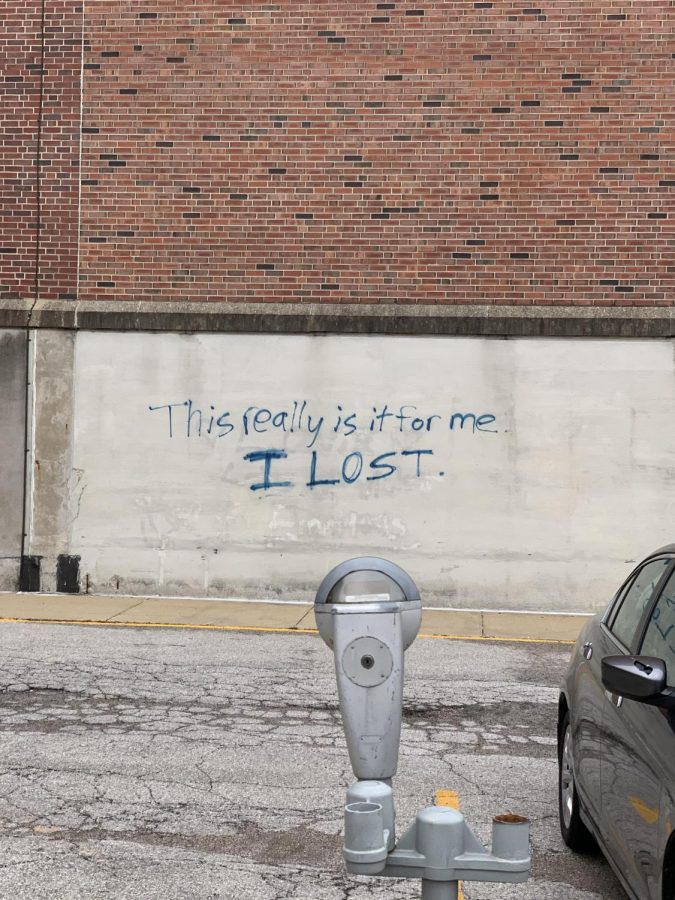Students feel burnout from ceaseless semester
Photo Courtesy of Reddit (/u/_sadcookie_)
Concerning graffiti lays painted on the side of the Main Library on Oct. 24. Some students have felt the negative effects of COVID-19 on their mental health.
Nov 2, 2020
With the semester 10 weeks in, Sarah Abdullah, junior in AHS, is feeling the weight of the amount of work she has to complete on a weekly basis. Classes continue to tear Abdullah away from her social life and destroy her mental health without avail.
“We’re just suffering through our assignments just to get to the next one and it’s a never-ending cycle Monday through Sunday,” Abdullah said. “I just feel like we’re not really able to catch a break mentally or emotionally.”
Abdullah has been struggling to balance her academic integrity along with her mental health these past few weeks, like many others nationwide.
“I know personally I take that personal burden on myself and give myself an idea that I don’t need anyone to help me through situations,” she said. “I don’t think it’s a healthy way to deal with our mental health.”
College students nationwide have been thrown into the same situation as Abdullah and sympathize with her rhetoric. Students are heavily concerned about their academic performance during the coronavirus and are extremely stressed with the current predicament.
Get The Daily Illini in your inbox!
Burnout has been extremely high in students this semester because of the pandemic, and many mental health services acknowledge this is a common issue among their student clients.
“I have a lot of clients who are students and motivation is something that we’re constantly battling,” said Erica Aina, a clinical supervisor at Elliott Counseling Group.
A large misunderstanding between the student population and the administration has resulted in student mental health deteriorating as the University increases course intensity throughout the semester.
Professors play a large role in affecting their students’ mental health, and supporting them is one of the most effective ways to help them navigate their classes during this pandemic.
Hallie Workman is a teacher’s assistant this semester and has taken up a social support role for her students in hopes to relieve their stress and help them throughout the course of the semester.
“I think if my number one goal is to get my students to learn, I have to make sure they’re okay first,” Workman said.
Understanding the position many students are in during this semester and being flexible with their classes has been Workman’s priority because she knows that not all the professors on campus are doing the same.
“I think professors and administrators and department heads need to solicit honest feedback from undergrads” Workman said. “I think that’s kind of the biggest thing that they’re missing right now.”
Providing a sense of security in the classroom and having professors take students’ input into account this semester will help address the concerns many will have in class because this is a new dynamic everyone is trying to adapt to.
“We can’t send students online in the midst of a global pandemic and wide social unrest and expect them to be as productive as a normal semester,” Workman said. “That’s insanity. We cannot keep the same expectations as we had last year.”
With this disconnect between the University and students, Abdullah believes the administration does not take mental health issues seriously and usually covers up these incidents.
“In the English building bathroom stalls there’s always suicidal comments, suicide notes or messages on the walls but they just paint over and act as nothing happened,” Abdullah said.
A recent case of this mental health epidemic can be seen through the various alarming graffiti statements that have been plastered across campus. Many students are concerned about their peers’ mental health but aren’t surprised that these comments are resurfacing on campus.
“I think that it just comes to show that people really don’t have an outlet when it comes to expressing how they truly feel,” Abdullah said. “I do think people are desperate right now and I can totally understand desperate feelings often get met with desperate action.”
Many students are unable to access mental health resources or are unsure where to go in order to get professional mental health services right away because of the limited amount of information available on the subject.
Nathan Oommen, president of the National Alliance on Mental Illness chapter at the University, is attempting to relay these mental health resources to the student body in order to help his peers.
The National Alliance on Mental Illness is an organization dedicated to improving the lives of people with mental illness.
“Our biggest thing was making sure the resources are available for people,” Oommen said. “Letting them know about the counseling center, DRES and different resources that are available that they may not know about.”
Abdullah thinks the University counseling center doesn’t provide adequate services at the counseling center due to the lack of funding.
“I think that the biggest issue is that the Counseling Center is underfunded and understaffed,” Abdullah said. “The counseling center gets only approximately $20,000 in funding every year but the University, investing hundreds of thousands and up to millions into the athletic programs.”
Access to resources on campus and off campus provides necessary aid to various students who require some sort of assistance when coping with their mental health.
Abdullah has emphasized the importance of acknowledging the mental health issue at the University and believes that this should no longer be covered up or hidden by the administration.
She planned the suicide prevention vigil on Sunday with a few other people on campus in order to raise awareness about this issue and shed light on the mental health status on campus.
“It’s another way to show that we really need to be there for each other as students and we really need to be taking care of one another and being easy on ourselves because no one else is,” Abdullah said.






